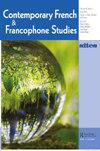Le Chercheur d’Afriques : Henri Lopes, Créolité , and Jazz
IF 0.2
4区 文学
0 LITERATURE, ROMANCE
引用次数: 0
Abstract
AbstractHenri Lopes’s Citation1990 novel, Le Chercheur d’Afriques, embraces the post-colonial reality of multiple roots (Glissant). Much like Jazz music itself, the novel embodies the principles of la créolité outlined by Bernabé, Chamoiseau, and Confiant in their 1989 work, Éloge de la Créolité. This paper will explore the rhythms, musical composition, and musical intersections that enrich and shape the novel paying particular attention to jazz music, lyrics, rhythm, and sounds embedded in the novel’s structure, language, and imagery, and examine ways in which the layering music and musical references throughout the text has the power to create soundscapes, evoke emotions and memories.Keywords: Henri LopesCréolitéJazzCongoFrancophone Notes1 All translations are mine2 The narrator, André, notes that he thought Mouloudji was biracial like him “because of his lips and his hair” (Lopes 14).3 In response to the question about the role music plays in Lopes’ work, the author replies, “En fait, je pense que l’entrée de la musique se trouve dans Le chercheur d’Afriques” (Prüschenk 130).4 A soundtrack for Henri Lopes’s novels compiled by Anthony Mangeon is available on YouTube at the following link: https://www.youtube.com/playlist?list=PLrBC0vF_Opv-o1CNGQPLdTJ3muA0ul-8i5 “www.rfimusique.com/siteFr/biographie/biographie_9027.asp”6 “www.pbs.org/wnet/americanmasters/print/robeson_p.html”7 “The drum beats, and insists, inviting the village to gather. Thump, thump, thump. Muted, throbbing beats. One, then several women wail. The drum continues its demonic rhythm as if to convince even the wise ones and the elders to get up to come stomp the ancestral grounds.”8 “Charlie Parker’s sax threw a musical serpentine into the piece, gliding, spinning, whirling quickly to take off again, unstoppable, into a spiraling rocket” (33).9 Mpoto = EuropeAdditional informationNotes on contributorsJulia PraudDr. Julia Praud is an Associate Professor of French at the United States Military Academy where she serves as the French Program Director in the Department of Foreign Languages. At West Point, Julia teaches a variety of courses from language to literature. Her research interests include francophone literature from Africa with a focus on post-independence literary production.非洲探索者:亨利·洛佩斯,克里奥尔和爵士乐
摘要:亨利·洛佩斯(ri Lopes)在Citation1990年出版的小说《非洲之车》(Le Chercheur d’afriques)拥抱了多元根源的后殖民现实。就像爵士乐本身一样,这部小说体现了伯纳伯纳、查莫瓦索和康菲纳特在1989年的著作《Éloge de la crolit》中概述的la crolit原则。本文将探讨节奏、音乐组成和音乐的交集,丰富和塑造小说,特别注意爵士乐、歌词、节奏和声音嵌入小说的结构、语言和意象,并研究在整个文本中分层音乐和音乐参考的方式,这些音乐和音乐参考具有创造音景、唤起情感和记忆的能力。关键字:亨利·洛佩斯(Henri lopescrolitjazz)刚果(congo)法语注释1所有的翻译都是我的2叙述者andr指出,他认为穆卢吉和他一样是混血儿,“因为他的嘴唇和头发”(Lopes 14)对于音乐在Lopes的作品中所扮演的角色的问题,作者的回答是:“En fait, je pense que l ' entre de la musique se trouve dans Le chercheur d ' afriques”(pr schenk 130)安东尼·曼金(Anthony Mangeon)为亨利·洛佩斯(Henri Lopes)的小说编录的配乐可在YouTube上下载:https://www.youtube.com/playlist?list=PLrBC0vF_Opv-o1CNGQPLdTJ3muA0ul-8i5 " www.rfimusique.com/siteFr/biographie/biographie_9027.asp " 6 " www.pbs.org/wnet/americanmasters/print/robeson_p.html " 7 "鼓声不停地敲着,邀请全村的人聚在一起。咚咚,咚咚,咚咚。柔和的,悸动的节拍。先是一个,然后是几个女人在哭泣。鼓声继续着它那恶魔般的节奏,似乎要说服智者和长老们站起来,来踏祖先的土地。“查理·帕克的萨克斯管在乐曲中抛出了一个音乐蛇形,滑行,旋转,快速旋转,再次起飞,不可阻挡,进入螺旋火箭”(33)Mpoto =欧洲更多信息撰稿人说明julia PraudDr。Julia Praud是美国军事学院的法语副教授,在那里她担任外语系法语项目主任。在西点军校,茱莉亚教授从语言到文学的各种课程。她的研究兴趣包括非洲法语文学,重点是独立后的文学创作。
本文章由计算机程序翻译,如有差异,请以英文原文为准。
求助全文
约1分钟内获得全文
求助全文
来源期刊

Contemporary French and Francophone Studies
LITERATURE, ROMANCE-
CiteScore
0.30
自引率
0.00%
发文量
43
期刊介绍:
An established journal of reference inviting all critical approaches on the latest debates and issues in the field, Contemporary French & Francophone Studies (formerly known as SITES) provides a forum not only for academics, but for novelists, poets, artists, journalists, and filmmakers as well. In addition to its focus on French and Francophone studies, one of the journal"s primary objectives is to reflect the interdisciplinary direction taken by the field and by the humanities and the arts in general. CF&FS is published five times per year, with four issues devoted to particular themes, and a fifth issue, “The Open Issue” welcoming non-thematic contributions.
 求助内容:
求助内容: 应助结果提醒方式:
应助结果提醒方式:


